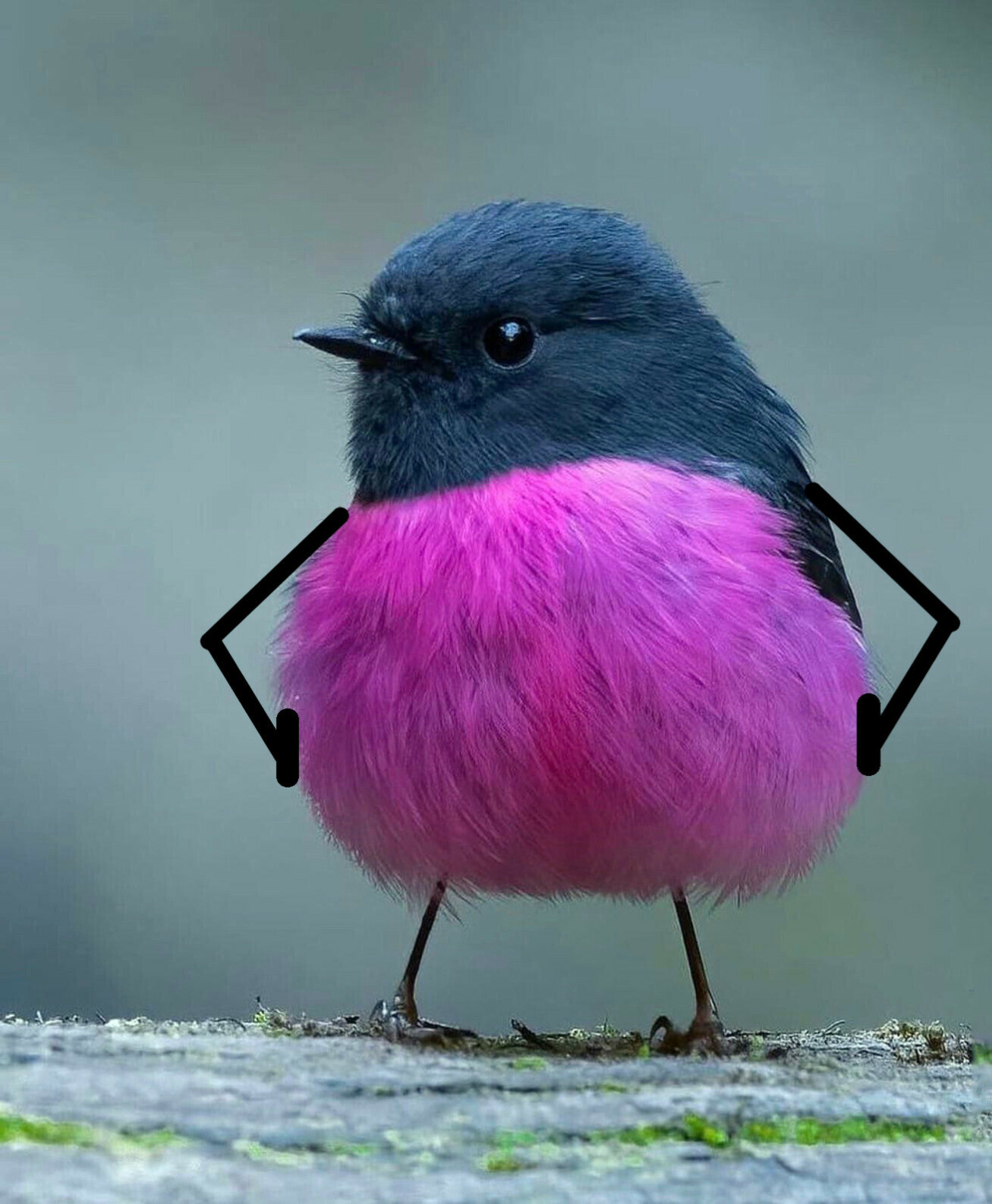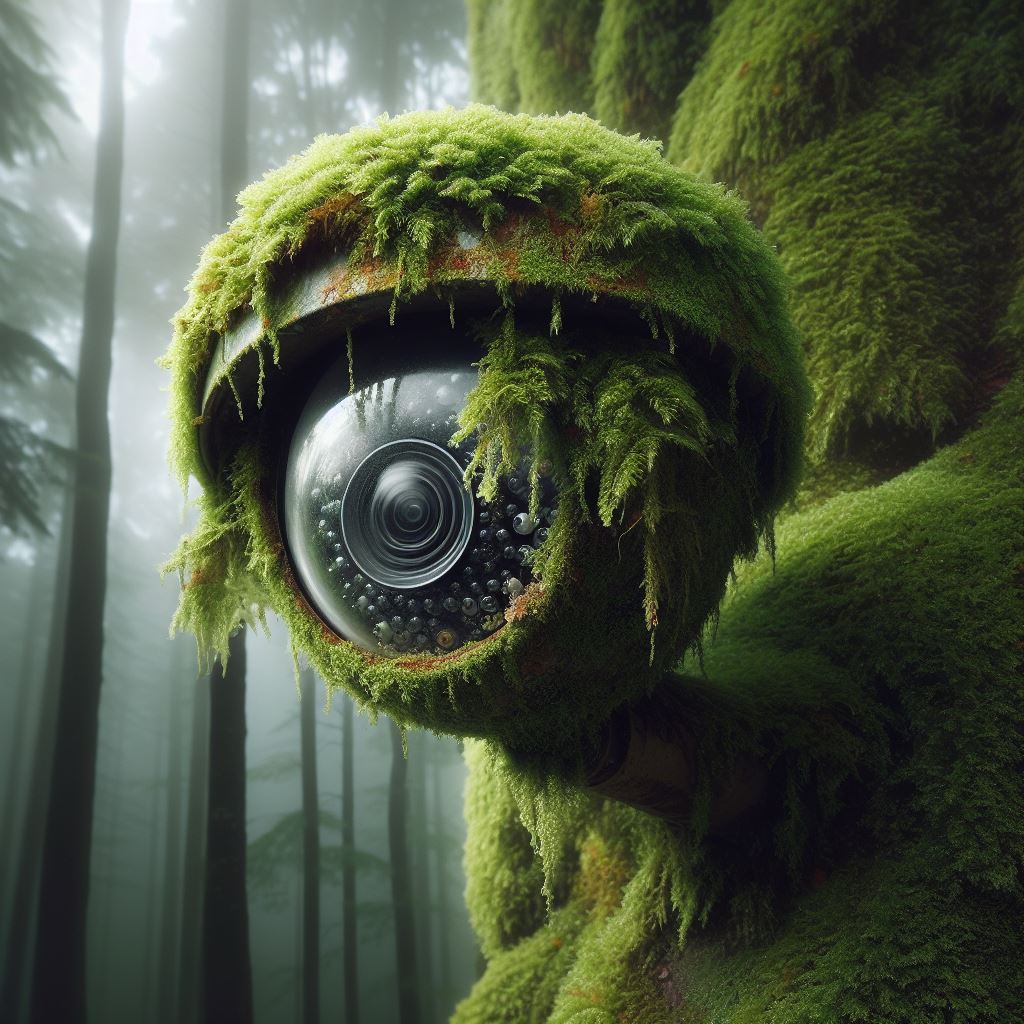As per requests, this is my description of auDHD experience. As there is very little research into this, I’m going to draw primarily upon my own personal experience and I’ll draw upon peer experiences and I’ll draw in bits of research through this post here and there. I am diagnosed with both ADHD and autism, both adult diagnoses, and there is treatment history to establish these as being accurate diagnoses. The psychiatrist who diagnosed me with ADHD gave me a diagnosis of primarily-inattentive ADHD but I had come to my own conclusions that I was probably combined-type which has had its hyperactive aspects mostly buried under trauma. My psychiatrist also independently arrived at this same conclusion unprompted. It’s worth noting that being combined-type will colour my experience of auDHD.
As a disclaimer, this is going to be my experience so it will be limited by that fact. This should only be taken as information and not the definitive guide or the be-all end-all of The One True™ auDHD experience.
To start, I think it’s of fundamental importance to understand that my experience of auDHD is one of internal conflict - I have competing sets of needs and desires. This manifests in a lot of internal struggle and it also means that my autistic or ADHD traits can be more prevalent and I can feel “more” autistic or ADHD, depending on my circumstances. (Maybe I’m a Marxist because deep down, at a fundamental level, my ADHD traits exist in a dialectical relationship with my autistic traits lol.) This manifests in a lot of extremes and a lot of bouncing between one extreme to the other.
Ultimately this is why I think I was previously diagnosed with a mood disorder and why it’s very common for late-diagnosed autistic/ADHD/auDHDers to be misdiagnosed with mood disorders.
So what does this look like in practice?
I thrive under most novel situations and under high pressure. I find it exciting and this really engages me. However, I also find that I hit my limit in high pressure situations very rapidly, so there’s a sweet spot where things are just new or high pressure enough that I thrive. Less, I feel pretty bored and checked out. More, I become an anxious wreck.
However this is counterbalanced by my deep and abiding need for stability, routine, and structure. I need enough that I can count on in my life that I feel capable of dealing with high-pressure and novel situations. Too much change, especially unpredicted change, leaves me really rattled and out of sorts (and not just feeling a bit uncomfortable but it can put me into complete disarray). It can take ages for me to cope with too much change or unpredicted change because, although I can be quite adaptable and flexible, if my base circumstances change then the pace at which I find my feet again is truly glacial.
This is also sort of why I find that I am either extremely well organised or I’m an absolute disaster, with little room in between. Without having structure and organisation, my autistic needs aren’t being met so I feel very dysregulated and I am far less capable of relying on this aspect of myself to manage my scatterbrained ADHD traits.
When it comes to socialising, I can be very gregarious. (It’s worth mentioning that I’m pretty high-masking when I want to be, so that may also be a factor here.) I am capable of being the life of the party and of facilitating stuff like group work and educational spaces in an engaging and interactive way, and have done so professionally. But this comes with a high level of social anxiety and an extremely limited social battery. I find that I much prefer facilitating, or better yet public speaking, than I do participating in a group activity especially if it’s unstructured or there are a lack of clear guidelines and expectations. So externally I vacillate between being very social to being extremely introverted, depending on a variety of factors.
Another aspect is that I genuinely do need a lot of time to recharge after socialising, even when it’s great and I’m really enjoying myself. Sometimes days. I feel like this is very much my autistic needs taking the front seat.
With regards to interests, this is a little bit tricky on account of being combined-type but I have very long, stable persistent deep interests (“special interests” but I am loath to apply that term to myself tbh). I also have the classic ADHD sort of brief, intense, transient interests that breeze in and breeze out just as quickly. There are things that I will always be interested in doing or talking about, then there are things that I have a sort of wild fling with before I find that I’ve suddenly wrung all the dopamine out of it and I’m ready to discard it and move on.
I’m capable of bending my deep interests and sorta redirecting them to topics that I need to prioritise but I’m not sure whether this is a me thing, an auDHD thing, a combined-type thing, or something else.
With regards to sensory processing, I am a fairly typical autistic scattershot of being mostly sensory-avoiding with some atypically high degrees of sensory-seeking, as per the Dunn Sensory Profile 2 administered to me as an adult. I am acutely sensitive to a lot of sensory input however my ADHD is a countervailing force here and I can be completely oblivious to certain sounds or smells or tactile feelings until suddenly my awareness is drawn to this and it becomes borderline intolerable. This may also be due to me being high-masking, having poor interoception, or experiencing dissociation due to lots of trauma, mostly developmental so keep this in mind.
With regards to trauma and rejection sensitive dysphoria, there’s evidence that ADHDers are more prone to developing PTSD symptoms. In my opinion one of the major factors in this phenomenon is the fundamental emotional reactivity inherent to the ADHD experience, especially if it’s not appropriately medicated. My autistic traits lead me to ruminate a lot and so there’s this unholy alliance that exists within me of my being more prone to traumatisation, having heightened emotional reactivity (even with regards to PTSD triggers that occur well after a particular event), and the classic autistic perseveration meaning that I get into ruts with my thinking that are very difficult to get myself out of. This is on top of the typical experience of PTSD and being emotionally and psychologically “stuck” in the traumatic experience. So it’s a double whammy. Or maybe an exponential whammy idk.
I experience rejection sensitive dysphoria and I respond to treatment for it. I think that RSD in an auDHDer is especially difficult as being autistic means that I am just prone to making more faux pas, I’m going to unintentionally annoy or upset people, I’m going to miss cues, and ultimately that I’m going to face a whole lot more ostracism and social rejection than if I were allistic. So not only do I have a lot of the psychological consequences of trying to exist in a social world that is far from well-suited to an autistic person, I also have very visceral responses in my nervous system when I think I have fucked up or when someone gives me the impression of negative social feedback (whether imagined or real) and this has a pretty major impact on me. I am of the opinion that the ADHD traits that make me inclined to seek out social interaction and push me to be novelty-seeking means that I am much more socially engaged than I would otherwise be and since negative social feedback affects me unusually deeply, I think this is one of the major factors in why I am capable of being very high masking to the point of probably doing quite well at being neurotypical-passing if I care to.
It’s my suspicion that most auDHDers are high-masking, not only because they tend to go undiagnosed and maybe even unaware of this personally for a lot longer and so they naturally develop strategies to compensate but because they tend to be more socially-oriented and I reckon they take knocks harder when socialising, all things being equal, so the end product is a person who is a sort of grizzled veteran who has learnt how to survive in the harsh wilderness that is the allistic social realm.
Moving on from that, I find that I am very extreme in how I experience fine details. I often plunge headlong into the deepest depths of detail but I am also quite careless and I can miss very obvious or critical details. I tend to shift between these two poles. Sometimes this also manifests in being so consumed by one aspect of the details that it’s to the exclusion of all the other details as well, although that’s more of a classic autistic experience imo. This might also be something specific to me but I am a voracious learner. Often I feel like my mind is like an odd-couple where I can get engrossed in a subject for virtually an unlimited period of time and I can be remarkably persistent with learning but I also have intense cravings for instant gratification and novelty which causes me to end up diving into one subject with great depth only to dive into the next soon after, and this pattern repeats itself constantly. It feels like half of my brain is constantly dragging me down one particular rabbit hole and the other half of my brain is desperately and impatiently dragging me to the next rabbit hole. This may also be something specific to me but I find that I’m actually quite a slow learner because of my needs to understand the intricacies of any given topic but, once I really grasp the fundamentals of something I tend to learn very quickly from that point onwards.
With regards to executive dysfunction, my experience is one of constant struggle lol. I feel as though I am constantly juggling too many balls - my need for novelty, my need for certainty and stability, my sensory diet, the need to stay focused and remember things, the need to observe the details so I don’t make simple mistakes and so I don’t find myself getting lost in any one particular detail, my need for routine and my fundamental incapability of maintaining a routine, attending to my interoception as I am very liable to not register that I’m hungry or thirsty or tired and so on. It feels like I am more or less constantly mediating the tensions between my different needs which often exist in direct contradiction to each other. So yeah, this means I burn out and I burn out hard lol.
I think ultimately my experience of auDHD is one where I can sometimes spot the very clear traits of either one shining through, such as struggling with pragmatics in communication and being completely capable of eating the exact same thing in perpetuity or being so forgetful and inattentive that I’ll put my phone down in a drawer only to close it to later have zero recollection of what I did and having a real drive to experience new things. But more often it feels as though I am an odd mix of the two or that there’s a sort of stalemate between the two and I feel like I’m kinda neither and yet both at the same time.
Sometimes this works really well, as my ADHD traits make me more adaptable and a bit more even in my interests and how I engage socially or as my autistic traits help me sustain my focus and to have a much better memory for things than I would otherwise have. I guess in short, being autistic keeps my ADHD traits more stable and consistent and my ADHD makes my autistic traits more flexible and it broadens my horizons. Each of them softens some of the rough edges of the other and I find that I can often lean into one in order to compensate for the deficits inherent to the other.
Unfortunately, the upshot of the autism and ADHD combo is that very often these needs compete and are in direct contradiction to one another as well. It’s a weird sort of in between space to exist in, one where the only relatable parallel that I can think of that comes remotely closely is ennui - that feeling of being bored but where it’s a conflicted or maybe a more existential sort of boredom; if you’re just purely bored, you find something interesting or exciting and you have fixed the problem and the need has been addressed whereas with ennui there’s a sort of restless interregnum-like quality where you experience a feeling of boredom but the thought of doing something exciting is also in itself boring somehow. That probably doesn’t make a lot of sense lol. Also for my experience of auDHD it’s not a feeling of being bored at addressing different needs but it’s more like craving new things whie simultaneously craving the same things and the same routine, of craving excitement but also being overwhelmed and craving quiet and calmness at the same time. It’s really quite odd to be honest.
Ultimately, while I identify with a lot of traits and experiences of pure ADHD or pure autism, I feel as though my experience of these are much more varied and they shift in intensity. I also think that the way that I present, even if I’m not putting in effort towards masking, is one where the traits of both are apparent but they aren’t easy to pin down because I readily switch between, say, a classic autistic infodump monologue to being very socially-engaging and mischievous like you might expect from an ADHDer. Or I can be incredibly details-focused while also being seemingly oblivious to details. That sort of thing.
Anyway, I think that wraps up my own personal experience of auDHD from an internal perspective.
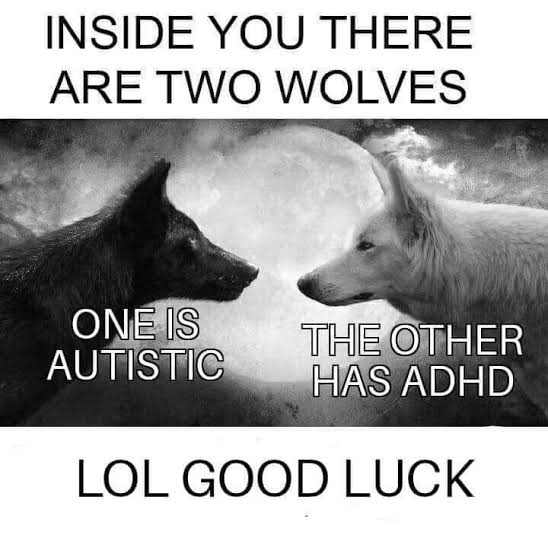
A lot of this sounds really familiar. I’m dealing with a lot of RSD right now diving into dating apps and seeing my communication issues come up time and time again, feeling like there’s a black hole forming in my gut because I might have inadvertently insulted someone and that’s why they’re not answering my text message
Also experiencing horrifying irrational guilt at the fact that I haven’t been keeping up on my Unmasking Autism book club, and identifying shame, sneaky motherfucker that it is, creeping back in on me, masquerading as simple anxiety and depression, and whispering suggestions of self-destruction and worthlessness into my ear again. You see, by not making posts on the Internet, I am a Bad Person™ and deserve the endless misery that is desperately needing human contact but being generally really bad at interacting with humans, only learning how to get by on trial and error and making people laugh and having absolutely no idea what to do when I can’t make them laugh. I’m starting to think I make people laugh the same way you would throw scraps of meat to placate a hungry predator. Like, a deep-seated fear of others is the motivation. Not just the desire to be liked, but the certainty that I will be punished if I don’t placate them. Lots of trauma informing this, I’m sure.
A lot of this sounds really familiar. I’m dealing with a lot of RSD right now diving into dating apps and seeing my communication issues come up time and time again, feeling like there’s a black hole forming in my gut because I might have inadvertently insulted someone and that’s why they’re not answering my text message
I’m a big fan of normalising being a part of the high social filter gang.
If you think I’m just making excuses rather than describing what I’m struggling with?
Oops - you just hit the filter!If you presume the worst of me or if you aren’t able to articulate that you feel upset because of the way I came off/the way you interpreted what I said?
Oops - you just hit the filter!Now I’m not advocating for just cutting everyone out of your life or anything lol. But it’s okay to have a high filter, and I honestly think it’s probably for the best especially for autistic people.
I need someone to say “Excuse me??” when something I’ve done feels insulting. I can’t deal with someone in my personal life who isn’t assertive enough to address these things, and likewise I can’t deal with someone in my personal life who isn’t going to listen to me when I explain what I had intended. If someone is going to brood on a perceived slight for days while expecting me to identify the change in their mood so that I will cast my mind back over the past week to try and figure out what did wrong, they’re going to be miserable around me and likewise I’m going to end up being miserable around them too; I just can’t afford to extend my masking so far that I’m constantly trying to shape my behaviour and language to meet someone else’s wants/needs while trying to decipher their emotional state and constantly going through mental replays to scour my memory for anything I did which might have caused offence.
That’s not to say that I expect someone to be perfect in this regard or that I’m giving myself a justification to switch off my empathy but I do need someone who is confident enough to be able to handle miscommunications effectively and collaboratively.
If someone isn’t capable of that or they aren’t willing to meet me on that level, that’s cool—I know I’m not for everyone and I’m a bit of an acquired taste—you do you. But I’m also applying that to me as well and part of that means having people around me who just understand autistic communication because they’re autistic themselves or people who I can work with to bridge the allistic-autistic communication divide.
Also experiencing horrifying irrational guilt at the fact that I haven’t been keeping up on my Unmasking Autism book club
I was wondering where things were up to with that.
I had thought about reaching out to you but I didn’t want to add to the pressure. I’m just glad that things are okay and, tbh, I think it’s safe to assume that everyone who is participating in the book club feels the same way.
Remember that you are facilitating a book club specifically on autism in a neurodivergent-specific comm. If that isn’t the perfect crowd to say “Oops, sorry - this slipped off my radar and then I managed to roll that up into a huge ball of guilt and shame which has left me paralysed” to then idk who would be better.
but being generally really bad at interacting with humans
I’m really not in the business of telling people how they ought to feel but one thing that’s been really important for me has been to frame my experience of being autistic in an allistic world as one of an (invisible) cross-cultural divide.
Other autistic people generally seem to just get me. Always have, even before I started self-identifying as autistic let alone being diagnosed.
My mannerisms, my speech, my tone, my body language, my way of interpreting communication - these are all fundamentally at odds with the allistic mode of communication. I genuinely feel when I’m masking as if I’m in a different culture and I’m consciously translating what I want to say and how I want to convey that message while also carefully and consciously interpreting the communication from allistic people.
I once was fluent in another language. Masking while engaging in social interaction feels close to a 1:1 of the experience mid-level proficiency in another language—good enough to get by with concerted effort but not so proficient that it feels effortless—including the executive function crash that comes after a long day of translating and existing in a fundamentally alien cultural context.
But the kicker is that it’s usually obvious when someone isn’t a native speaker and people adapt and adjust their expectations accordingly. They also tend to extend a lot of grace to people from different cultures too.
I don’t get that same sort of consideration because I pass for being native to the allistic culture when it’s really not the case. That means people have higher expectations of me and they are less patient, less forgiving, and less understanding. In a lot of ways I think it’s actually harder to be autistic in an allistic world than it is to be a somewhat-proficient second language speaker in a different cultural context.
At the end of the day, I just have a fundamentally different way of communicating and experiencing the world but this is (mostly) invisible to others. That doesn’t mean therefore I’m bad at communicating any more than it means that your average allistic person is bad at communicating because they aren’t well equipped for communicating on the autistic level, it’s just different.
In fact, I’m proud of how well I communicate with allistic people and the amount of effort I put into this. If I end up in a situation where there’s an allistic-autistic miscommunication, as I inevitably will, I’m not going to shoulder all the blame for it. I’m doing my best and if I wouldn’t beat myself up for unintentionally saying or doing the wrong thing in a different cultural context then why would I do this when I’m essentially in an allistic-autistic cross cultural context? I’m quite happy to chalk these miscommunications up to being the product of a cultural divide tbh.
I’m starting to think I make people laugh the same way you would throw scraps of meat to placate a hungry predator. Like, a deep-seated fear of others is the motivation. Not just the desire to be liked, but the certainty that I will be punished if I don’t placate them. Lots of trauma informing this, I’m sure.
You are sufficient. Some people might want more or they might want something different, but that’s their own business. If you want to entertain people or to make them laugh then go for it but remember that you don’t owe them this.
This is such a great comm

I sought an adhd diagnosis earlier this year, and definitely feel like I fall under the audhd umbrella. Similar with my spouse, though I think she’s filled out the “Au” spec tree more, while I’ve focused more towards the “DHD” spec tree. I think we both (definitely me at least) internalized a lot of the “neurodivergence = bad” rhetoric that was prevalent in society during our childhoods. But now we can recognize these aspects as being key parts of ourselves, and embrace them, and extend that same kindness to others. (Except, sometimes, allistic/neurotypical people who I frequently want to shake lol)
I was going to make a more developed point- but I’ve forgotten what it was. Mostly wanted to say that everyone who posts here genuinely makes it such a supportive, educational community- even for lurkers like me.
Holyyyyyyyyyyy fuckiiinnnnnngggg shiiiiiiiiit you just described my life in disturbingly accurate details. Literally everything, the social aspect, the battery, the contradictions, the weird-ennui, every detail of this is EXACTLY my experience.
Fucking thank you. Wow.
Thank you so much for the detailed response! the part about it being an internal struggle really hits home, in fact most of it really hits home. I have been trying to add more to this comment but honestly you have soul-read me and I have a lot to think about so thanks again

I’m glad that you found it useful. Thanks for giving me the nudge I needed to write this out!
if you’re just purely bored, you find something interesting or exciting and you have fixed the problem and the need has been addressed whereas with ennui there’s a sort of restless interregnum-like quality where you experience a feeling of boredom but the thought of doing something exciting is also in itself boring somehow.
Contrary to what you said, this actually makes a lot of sense lol, and I think that all of what you wrote made me realize I really should get checked (for anything really). This sounds too close to home. Thank you again for sharing!
Out of curiosity (and only if this should apply to you and you feel comfortable sharing): Does auDHD also interfere with your experience of sexual desires? Meaning, is there conflict in that regard between autistic desires and ADHD desires?
Out of curiosity (and only if this should apply to you and you feel comfortable sharing): Does auDHD also interfere with your experience of sexual desires? Meaning, is there conflict in that regard between autistic desires and ADHD desires?
Yeah, I’d say that it does.
For me I find that I’m usually careening from one thing to the next - “Fuck I haven’t eaten all day, I’m starving” to “Holy shit, I’ve been researching something for 5 hours straight and it’s now 3am and I need to sleep. But also if I don’t pee immediately I’m going to explode.” and it just goes on like that a lot of the time. Maybe not always to that exact degree of intensity but I’m using some liberties to paint a picture.
So I usually find that the most urgent need bubbles up to the surface for me and then that’s the main focus until the time when something else bubbles up - it might be something really minor like my sock not sitting correctly on my foot, it might be external committments, it might be that a particular word has caught my attention and I need to understand its etymology. This also applies to my experience of sexual desire in a broader sense, in that I can be completely uninterested in sex because my focus is elsewhere, and this can go on for long periods of time, but then suddenly I find that my libido takes centre stage so yeah.
I think one aspect of this experience of competing areas of focus or need is probably best explained by the bathtub metaphor (which is often applied to dealing with trauma) - if you can imagine a bathtub filled with water and kid’s toys, when you go to empty it of toys, you pull one thing out and then something else emerges from beneath the surface to take its place. And on and on it goes, but eventually things stop bobbing up and you will find that you have emptied the bathtub of toys.
I feel like that’s a good metaphor for what it’s like for me with my focus and my needs - something is at the top and once that gets dealt with then the next most urgent thing bobs up and so on. When things are good and I’m doing well at taking care of myself, my lower priority and less urgent needs get a chance to bob up to the surface with less pressure behind them because the tub isn’t as densely populated.
I guess what I’m driving at here is that when I’m more centred and I’m addressing my needs and I’m well supported, I find that my sexual desire is more even and moderate.
is there a conflict between autistic desires and ADHD desires?
That’s an interesting question.
I don’t struggle with being in a monogamous relationship or with infidelity, so the ADHD need for novelty and excitement doesn’t affect me in that respect.
On a sensory level I often have a strong preference for good foreplay over sex, which I think is a bit unusual for someone who is amab.
I’m not sure whether it’s a product of being queer or of my particular disposition or whether being auDHD plays into this but I am pretty adventurous, so that could be the novelty-seeking aspect of ADHD’s influence there. I also find that I’m not constrained by concerns about things like gender roles, which is a common thing amongst autistic people in a broader sense - it’s not unusual for autistic people to be pretty agnostic about gender nor is it unusual for them to be unconcerned by stuff like social conventions and norms.
I find whoever I’m with, I need good communication from them in order to feel genuinely secure and comfortable. Enthusiastic consent isn’t necessarily shouted at the top of one’s lungs, otherwise living in a sharehouse would be an especially hellish experience lol, and so when it comes to people who tend to be more meek in bed, I find myself checking in a whole lot more and I also find myself drawn out of the experience to attend to reading the other person’s subtle and nonverbal cues to ensure that I’m not missing something so, in a sense, this is where my autistic traits can be kind of annoying and I end up seeking reassurance that I have the green light perhaps a bit excessively under these circumstances as well (that sounds problematic but I don’t mean to imply that it’s possible to have “too much” consent but rather that it can be frustrating for the other person who is like “I already said yes to that twice, what’s the hold up??”) So my need for direct and unambiguous communication can be something that draws me out of the experience with people who are less assertive, which is fine btw - I’d rather be drawn out of the moment every time than to overstep a person’s boundaries unintentionally, but this probably also draws the other person out of the moment somewhat as well because I might find myself asking them a lot of questions. Once I am more familiar with how someone communicates in bed obviously this becomes less of an issue though. When it comes to people who are confident and assertive, my communication needs are rarely a cause for annoyance because the communication from them is usually extremely clear and direct.
I don’t find my autistic need for routine or for following a set procedure to come into play with regards to sex. I can be really fucking oblivious to the subtle (and maybe some not-so-subtle) indications that a person wants to have sex with me, even if they happen to be long-term partners.
This is something that I’ve never really thought about until you asked. Hopefully that answers your question.
It does, and thank you! I can relate a lot to what you said, especially the bubbling up of “new children’s toys”. And I would also definitely agree that you cannot ask for consent too often. Rather interrupt the moment than be uncertain or ambigious about it.
I don’t have a lot of words for this, but just wanted to say 1) thank you and 2) this hit very very close to home…
I was also diagnosed with adhd as an adult but I came to the conclusion a few years ago that there is a smattering of ‘AU’ inside of me. I’m old and set in my ways now, but toast realization has helped me communicate my needs and feelings to my partner and family.
Thank you again for a very thoughtful and detailed writup of what it’s like.
Thanks for the feedback, I genuinely appreciate it - I was kinda worried that none of this would make sense to anyone except for me but hearing that it resonates with others means that I must have done a decent job.
This sounds exactly like me, and now you’ve convinced me I have both as well lol. First I thought inattentive adhd, then after stimulants it was clear I had autistic traits. The stimulants burnt me out so hard (and guanfacine made me sick) that I was convinced that they didn’t work for me because I have actually been autistic this whole time and not ADHD. Otherwise the meds would have worked, right? So I’ve been talking to my therapist about my autism. But every single thing you just described is like you read my mind. Now what?
(also do you have any advice for how to get a routine going? I think that’s what I need the most right now.)
This sounds exactly like me, and now you’ve convinced me I have both as well lol.
I’m not gonna lie, there was a part of me that felt concerned that everything I wrote in this post would be unrelatable and all specific to just my personal situation, that other people would be like “The fuck is this person even talking about!?” so I’m relieved to hear that it makes sense to other people who experience the same.
First I thought inattentive adhd, then after stimulants it was clear I had autistic traits. The stimulants burnt me out so hard (and guanfacine made me sick) that I was convinced that they didn’t work for me because I have actually been autistic this whole time and not ADHD. Otherwise the meds would have worked, right? So I’ve been talking to my therapist about my autism. But every single thing you just described is like you read my mind.
So there’s a comment I made recently that has all the things I wish someone had told me when I started on stimulant meds here. One caveat though: I think that ADHDers generally tend to notice a significant reduction in anxiety when on stimulant meds but I am not convinced that this is necessarily as common for auDHDers.
It’s super common to get burnt out on stimulants as an adult, especially if you’ve been through a lot of shit in life in a general sense and/or it’s been a really arduous process of arriving at the diagnosis of ADHD.
This is compounded by a few factors:
-
AuDHDers tend to report being sensitive to stimulant meds.
-
It’s my hunch that auDHDers are more prone to autistic catatonia and, while studies indicate that stimulants are helpful with catatonia, I’m of the opinion that in the mid to long term stimulants are prone to aggravating catatonia. (Catatonia very likely being interchangeable with burnout in this case.)
-
Stimulants tend to make your nervous system more reactive. This isn’t always the case because it’s a complex matter but auDHDers may find themselves trading off between improving their executive function with stimulants at the expense of being more prone to becoming overstimulated and imo suppressing or internalising the experience of overstimulation on an ongoing basis is a fast track to burn out.
AuDHDers routinely report that when they are on stimulant meds they feel “more” autistic. My hunch is that if your mind is a whirlwind of hyperactivity or your attention is so thin on the ground then when stimulants help to address this and with a quieter, more focused and attentive mind you are able to notice your autistic traits more readily. I also think there’s probably something in there with ADHD sorta taking a predominant role which sidelines autistic traits because autistic traits tend to be more subtle, a bit like when you’re in an emergency and you’re just focused on the immediate situation but you don’t even realise that below that urgent experience which is blanketing out everything else, it turns out that you’re actually really hungry but all of your awareness is devoted single-pointedly on the situation so it’s only after the emergency is resolved that you are like “Holy fuck, I’m starving all of a sudden??”
Now what?
Honestly, that’s a hard question.
My general advice would be to consider revisiting stimulants at a low dose. Note that different stimulants can vary in their effects and from person to person so responding badly or not at all to one stimulant medication isn’t conclusive evidence imo.
I’d also inquire with my prescribing doctor about adjunct ADHD meds. I’m a big fan of clonidine for me personally - it helps with my sleep, it has basically resolved my PTSD nightmares, it really dampens down my RSD, it works well for me to counterbalance my sensitivity to the norepinephrinergic side-effects of stimulants, but perhaps most importantly for your question it really helps me with regulating my nervous system.
Clonidine doesn’t work for everyone though and there’s a sweet spot with it - too much and you’ll sap all your motivation to do anything because your brain will be critically low in norepinephrine. I’ve heard reports that ADHDers tend to respond well to either guanfacine or clonidine but generally not both.
I’d encourage you to try and trace out the causes of that burnout: was it that you lost your appetite and your diet was significantly impacted? Did the stimulants disturb your sleep? Did you find that you were pushing through tiredness, the need to take breaks, and the need to eat during the day? Was your nervous system getting really dysregulated by your sensory “diet” at the time? Did you notice that your brain started dredging up old, unresolved trauma which led you to burn out? Were you just on too high a dose or were there any difficult side effects from the meds?
There’s a lot of causes and it’s likely that there were multiple factors involved. I can’t tell you what they were for you but you will be able to determine what happened last time and this will put you in a better position to manage these factors if you go back on stimulants.
I can help workshop some of this stuff with you, especially in regards to meds that are useful for ADHDers, but of course I’m not an expert so take what I say as being general pointers and not as professional advice.
(also do you have any advice for how to get a routine going? I think that’s what I need the most right now.)
That’s a big question.
First thing, if you’ve got ADHD or you suspect that you do then it’s always going to be an uphill battle on a neurodevelopmental level. Reconcile yourself to this.
I think that appropriately-medicated ADHD is important for establishing routines and habits because it’s the dopamine that is crucial in the neurochemical reinforcement of whatever pattern you’re trying to establish. If you’re low on dopamine, you’re going to be attempting to establish a routine on hard mode and there’s not really any way around that fact.
Next, a lot of habit and routine advice comes from well-meaning neurotypical people which works for them. This is not necessarily applicable to autistic people/ADHDers/auDHDers.
One thing that I urge this cohort to be very cautious and mindful of is habit stacking and task stacking. While everyone does this to some degree, and while this is very helpful and often important, the risk of stacking for this cohort is twofold imo:
- You run the risk of stacking too much and bringing about inertia, paralysis, executive dysfunction, and overwhelming yourself.
Making a habit stack of checking that a door is locked when you leave the house?
Great!Having a huge chain of tasks that you feel that you must do, making it feel like you can’t even get up because it has all snowballed into one massive project?
Not so great!- The more you stack, the more vulnerable your habits or routines become to being disrupted.
This is where the autistic traits take centre stage but if you have a big stack that you work to and, for whatever reason, you have to change the order or you aren’t able to do certain parts of the chain then this can really make it difficult. At worst, your brain can get kinda frozen or it can go into full autistic revolt because of unexpected changes.
Next up, I hate the “swallow the frog” advice for this cohort. I think this is a shortcut to being completely overwhelmed and hamstringing your motivation and productivity. I’m a big fan of starting very small and going for the easiest task so you can start to build up momentum with which to tackle the larger tasks rather than trying to force yourself to do the biggest, most difficult task first.
Following up from that point, I think it’s really important to milk the dopamine as much as possible from a routine. Checklists are great because you can cross things off and you get a sense of progress. It also offloads some stuff from your working memory by outsourcing it, which is a good thing all round.
I try to very consciously cultivate a genuine attitude of appreciation and gratitude towards myself for doing tasks and routines. When I wake up late and I’m scrambling to get out the door, I will consciously turn my attention to how I put my wallet and keys and stuff into their designated place the night before to feel thankful that I saved myself a lot of stress and a lot of time. I often go carrot-and-stick with myself, recalling the last time I lost my wallet and keys because I didn’t put them in their place, and how this negatively affected me, then I contrast that to my current experience.
[Continued…]
[…Continuing]
I think it’s also important to start small with routines and to aim for something that is below 75% of your capacity, however you wanna measure that. If you are trying to implement a new routine and it requires you to devote 90% of your effort to maintain it then you’re setting yourself up for failure because it will fall apart as you are inevitably going to be operating at 60% when you happen to have a bad day.
So start realistically and don’t bite off more than you can chew. You can always incorporate more into your routine once you’ve settled into it.
It’s also important to recognise that you’re probably not going to be able to maintain the routine indefinitely, there are going to be some setbacks and disruptions along the way. That’s okay. A routine that is done 50% of the time is infinitely better than a routine that doesn’t exist, so remain focused on the positives and on the benefits that you got from it. Don’t adopt the attitude that one slip-up or a couple of missed days means that you blew it.
External motivation can be really useful for ADHDers especially. If there’s a way of having accountability outside of your own head, even if it’s just a habit tracking app or a whiteboard, then use it to help reinforce your motivation. Understanding the ADHD interest-based nervous system so you can take advantage of how it works might be really useful in this respect:
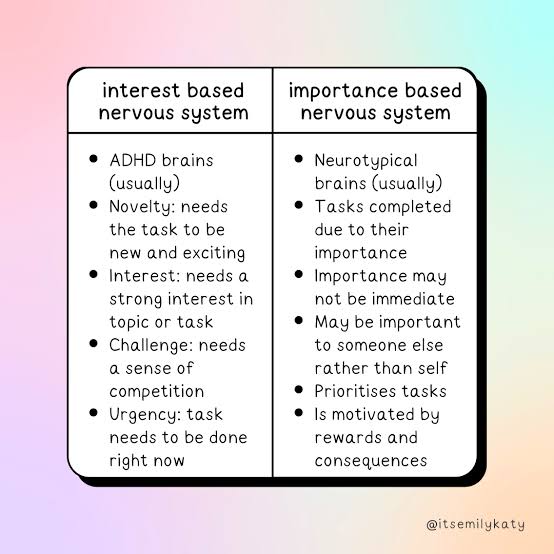
Last of all it’s hard for a seed to sprout and grow a firm network of roots unless the soil is conducive to growth, and likewise it’s hard for a routine or habit to be established if the conditions are hostile. If you are burnt out, if you get home from your day and immediately collapse into executive dysfunction, if you are chronically overstimulated, if you aren’t taking reasonable care of your physical and mental wellbeing, and stuff like that then it’s just going to be really hard work to establish routines and habits. You cannot pour from an empty cup, y’know? Sometimes it’s about addressing the underlying issues which are obstructions to having a routine rather than being about trying to implement strategies to create routines.
Sorry I don’t have some awesome, one-sentence piece of advice that changes everything. I really wish I did, believe me.
Thank you!!

I also showed this to my mom and she relates to a lot of it too.
I know I could try other types of stimulants other than Vyvanse, but I’m scared to try again because of how badly it fried me… I feel like I’m just starting to recover from that, and that was last year. I’ll bring this up to my therapist though.
Also I’m taking zoloft because it seems to help reduce my sensitivity, but I’m wondering if I should be trying something else, but I’m afraid to go off of it…
-

I have to read ans consider before I have any meaningful way to interact with such a good effort post until then
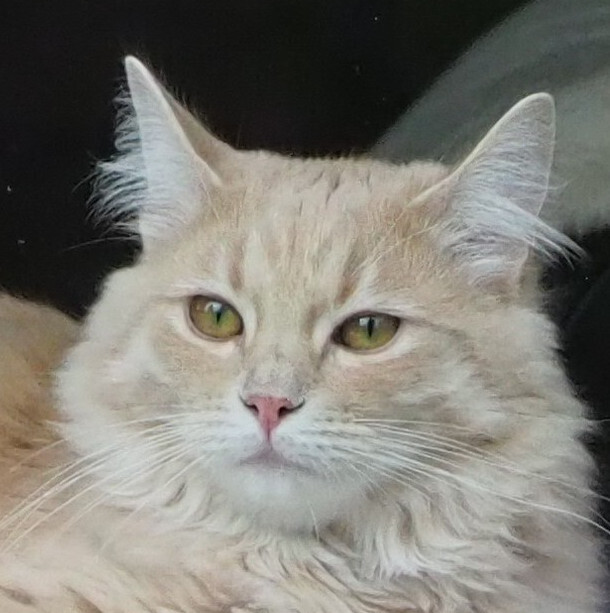 6·20 days ago
6·20 days ago
ReadFanon is writing about AuDHD again.
But you wrote a post! Great to see.
RSD
Omg, so that’s why I felt that bad about [that one time]! Interesting, thanks!
Realizing my constant mouse tapping is (probably…?) stimming is… I just had the word then I forgor. Anyways, doesn’t change much but interesting nonetheless.
You are single-handedly improving my understanding of AuDHD. Thank you very much. I like your posts and comments.
“if my base circumstances change then the pace at which I find my feet again is truly glacial.”
Very much the story of my life. Thank you for having the spoons to articulate all this.

It’s a weird sort of in between space to exist in, one where the only relatable parallel that I can think of that comes remotely closely is ennui - that feeling of being bored but where it’s a conflicted or maybe a more existential sort of boredom
I get this so often where I feel like brain is pulling me in multiple opposing directions and I get extremely fatigued and disinterested in doing anything. Last week I was messing around on my piano, got up to go to the toilet, and on my way back just collapsed into bed where I stared at the ceiling, drifting in and out of consciousness for about 6 hours. This has been happening more frequently and I don’t really know what to do about it. I sometimes feel like I’m paralyzed while the various factions in my brain fight each other for control.
The novelty/routine dialectic also helps add context to the last time my mental health issues faded into the background and I was able to thrive. We had a new roommate move in that I hit it off with on day one. We talked for hours every day relating stories and learning about each other (novelty). We also settled into a routine of going for long bike rides every Sunday and climbing at least once per week. Beyond that the knowledge that we would see each other on a daily basis, go for walks, cook together, etc reduced uncertainty about what I would do with my time and helped me focus on things that mattered. This is in contrast to now where this person has moved out and I am faced with an empty void I need to fill. The routine has been dismantled and the ADHD is really resisting me as I try to establish a new one.
Amazing read and deeply relatable, thank you. I’m hoping this will help me conceptualise some aspects of my experience a little better
Can a person show autism issues with avoiding eye contact? I had an ADHD diagnosis at age 5 but, recently I’ve been suspicious of autism being an issue, with symptoms I’ve discussed here before that don’t seem connected to ADHD.
Going back to high school, my teachers would complain sometimes that I needed to make better eye contact. It seems to get worse the longer I’m away from people in general and can be an issue when meeting initially people that I’m not used to. It really confuses me when dealing with addressing groups of multiple people because I don’t know which to focus on, so I end up looking everywhere.
Idk, it’s been something that adults in my life have discussed that I wish I had better addressed.
So unusual eye contact is a very common trait in autism.
The most obvious example is avoiding eye contact but autistic eye contact gets pigeonholed into being exclusively this when, in reality, it’s not unusual for an autistic person to give very intense and sustained eye contact as well. Generally eye contact tends to be avoided in low masking autistic people but as the masking increases the eye contact tends to be more intense until you get to very high masking, where eye contact is often roughly that of an allistic person. Note that this isn’t something scientific or diagnostic, it’s just a general trend, and it isn’t an absolute thing; I worked with one autistic person who was low masking and who had quite high support needs that comes to mind. They would often avoid eye contact but at times they would give very intense sustained eye contact as well. Similarly when I’m in high masking mode, I can slip from fairly allistic-passing eye contact into giving intense eye contact unintentionally but on the other hand if I genuinely need to focus in order to recall information or to receive multi-step verbal instructions (ugh) I’m almost immediately going to break eye contact and avoid it while I’m focusing.
What defines it is that it is unusual and it’s viewed as somewhat socially inappropriate; me breaking eye contact to focus in closely to what they’re saying feels “wrong” to an allistic person, very intense sustained eye contact feels intimidating or threatening to an allistic person even if the autistic person is doing their best to show good manners by using eye contact to indicate that they are listening, eyes that switch from intense eye contact to an averted gaze and back again might be interpreted as the person being furtive or untrustworthy when really it could just be an autistic person trying to perform to allistic expectations of eye contact.
Is unusual eye contact the defining characteristic of autism? No.
Is abnormal eye contact one indicator that a person might be autistic? Definitely.
Are there other factors that may influence “unusual” eye contact? Absolutely - different cultural norms, social anxiety, visual impairment, neurological differences besides autism, having ADHD and making eye contact before lapsing into a daydream so that you accidentally end up giving someone the death stare or being so distracted that you can barely maintain eye contact… there’s too many potential causes to list.
Without knowing more it’s very hard to give an indication one way or another though.
I don’t just avoid eye contact, I also try to make eye contact but, it still comes off weird. It’s either too short a glance or sometimes too long. I guess I have trouble trying to show how I’m paying attention to people, especially when addressing groups. It was that plus fidgeting that made a lady at the child autism center at my university suggest I get evaluated as an adult.
Yeah, those are two of the more obvious external signs that point to autism as a distinct possibility.
I think that most allistic people don’t really think about eye contact much at all, and it’s not at all common for allistic people to try and do eye contact “properly” - it’s something that seems to come quite naturally to them.
On the other hand, it’s super common for an autistic person to get a lot of negative feedback for the way they do eye contact - from “not paying attention” to having a “dead stare” to being “confrontational” or “shifty”.
It honestly feels like there’s a whole kaleidoscope of rules and implications and contextual factors with eye contact that allistic people seem to know implicitly and adhere to instinctively, just like with other forms of communication, that I don’t understand as an autistic person (or that I kinda get the basic rules but I have to be very conscious of them).
It’s a bit like:
Give eye contact to show that you’re paying attention to someone when they are talking but if you don’t show small gestures and micro expressions occasionally during this then you will indicate that you are checked out from the conversation but if you show too many small gestures and micro expressions then you will indicate that you are anxious or you are trying to get the other person to hurry up and you also have to look away occasionally but if you look in the wrong direction then that will indicate that you think the person is lying or that you strongly disagree with what they just said so don’t look away when they are making a point that you agree with but remember to only look with your eyes without shifting your head or it indicates that you aren’t interested and if you look away too often you will indicate that you are trying to hide something or that you are avoiding things but if you don’t look away enough then that will be confrontational and aggressive and if you look away at the same place too often then you are telling the person that they need to look at what you’re focusing on and it can distract them or interrupt them so you need to look at different things each time and and if you look at your shoes then that generally means that you are expressing shame or guilt and if someone joins the conversation then you need to give them a short amount of eye contact when they do in order to show that you welcome their presence in the conversation but if you give them eye contact for too short a time then it’s considered rude and dismissive but if you give them too much eye contact then you are telling the person who is talking that you aren’t interested in them…
If this sounds similar to the rulebook that you have developed over time yourself through a lot of hard lessons by doing the “wrong” thing, and if it feels like you keep these rules in your mind when you’re giving eye contact then that gives strong autistic vibes.
A lot of this resonates with me. I keep this in mind when I reflect on my failings. The part about not wanting to appear anxious is pretty solid but, the fact I’m in this uncomfortable situation where I’m worried of messing up makes me want to get out of the conversation immediately and not appear shifty.
Plus there’s trying to look up from they eyes at people’s foreheads rather than down towards their neck and chests.
I really became self aware of all this when around early high school I had a difficult time adjusting to talking face to face after a summer break away from everyone who wasn’t my immediate family.
very illuminating post, thanks for all of it.
I’m trying to understand my weed consumption better, and how it might be related to my a(u?)dhd. I’ve heard many with adhd self-medicate with weed for the stimulation, is that right? Have you written about weed and audhd before or do you have any resources you think are worthwhile? It just doesn’t seem to have the same effect with me than with more allistic people, or at least it seems that way to me - and I’m curious about the connection there, if there is any; especially the differences in adhd+weed and audhd+weed.
If you have any experiences or third-hand knowledge to share there, I’d be greatly appreciative. If not, that’s fine too, I’ve learned a lot already from your posts; so thank you again.
Oh sorry, I completely missed the part about self-medicating!
Yes, ADHDers tend to be pretty prone to self-medicating and to addiction. Autistic people are also pretty prone to it. In my opinion you kinda have two streams that the self-medication goes down:
The stimulation-seeking and the stimulation-avoiding.
For stimulation-seeking, you tend to find a whole lot of caffeine abuse (I see y’all) but also amphetamines and MDMA (MDMA itself being a stimulant - that MA is there for a reason!) as well as similar drugs. You also find alcohol as well as things like ketamine here but they tend to be used in high-stimulation environments like clubs and raves and bars to enhance the experience. This is the more classic ADHD sort of scene and drug use.
On the other hand, for the stimulation-avoiding, you tend to find alcohol but this happens more at home and I’d say more often with day drinking. This is where you find a lot of the genuine “just to take the edge off” sorta drinking (as opposed to the “I’m telling myself that I’m just taking the edge off but in truth I’m answering the call of addiction”) and other drug use. Of course this is where you find a lot more depressants and opioids and a lot more cannabis use too. This usually takes place at smaller gatherings and low-key house parties that give opium den vibes more than they give Ibiza vibes. This is the more classic sort of autistic scene and drug use.
One major exception to this is that people who are prone to overstimulation and people who are prone to being understimulated can take the exact same drugs to go to the exact same events for diametrically opposed reasons - an autistic person might need to use cannabis or alcohol to relax and feel less on edge in order to cope with the overstimulation at a club while an ADHDer might do the same to amplify the experience. An autistic person might take mdma before going out so they can feel happy and socialise more easily while an ADHDer might do the same so they can really cut loose. Which is kind of confounding but if you observe their behaviour usually it’s fairly obvious that the person who tends to get drunk and vibe by themselves on the dancefloor is clearly different to the person who is getting rowdy at the bar and is making 5 new friends tonight.
That being said, I am talking in broad generalisations here - some autistic people get utterly smashed at a bar and make a bunch of new friends (this is actually quite common) while some ADHDers are so burned out from trying to keep it together and to be on time every morning at their office job that they go to the same bar, hunker down in a corner by themselves, and drink away their misery temporarily. So don’t take this as being something that is anywhere close to being definitive.
hey, genuinely thanks for your answers, lot’s to think about
I start every day with a medium amount of coffee, tobacco and weed and a few hours later I even end up eating something. I feel like I’m often both under- and overstimulated with different things at the same time when sober, and a steady consumption of tobacco and cannabis throughout the day sort of modulates it out to where the world isn’t just bearable but wonderfully interesting, enchantingly complex, vibrant in color and sound without being overbearing - the opposite of the hopelessly boring, grey-as-concrete noisescape that it often appears to me when sober. It’s not like I don’t have sober days, but I try to avoid them when I can… I hear you on the ‘prone to addiction’, it’s why I’m trying to understand it all a bit better. What it’s doing for me, where the pitfalls lie, etc. Pretty sure the tobacco is the most dangerous substance in the mix - interestingly, I usually don’t fall back on pure tobacco when I can’t smoke weed with it, which is a common thing I see with other enjoyers of the good herb; they might stop smoking weed, but they’ll continue smoking, being hooked on the nicotine.
Anyways, bit rambly there, thanks again and cheers
No worries.
I’m often both under- and overstimulated with different things at the same time when sober
This in particular pings my radar. If it wasn’t already pretty obvious from what I have written here, my experience of auDHD is a lot like Goldilocks except my needs are more capricious.
This is a really good question.
I used to smoke a lot of weed before I was diagnosed or had an inkling that I was auDHD so I’m going to try and cast my mind back.
One thing that does stand out to me is that I know of one person who is at least autistic that definitely uses cannabis to manage their catatonia, which tbh kinda tracks. It’s pretty rare for autistic people to be diagnosed with autism with catatonic features, let alone to be treated for catatonia.
In my case, I recall finding cannabis to really help ease the tension I would carry in my body and the degree of anxiety that had gradually ratcheted up over the day(s). I feel like it helped me to decompress from sensory overload too but I was super disconnected from my sensory experience back then so it’s hard to say for sure.
I actually think cannabis gave me an opportunity to unmask a lot too, not that I was aware enough of this at the time.
It’s worth noting that I have a really strong preference for high CBD cannabis and ingestion methods over high THC, because I can find THC a bit heady.
especially the differences in adhd+weed and audhd+weed
Well I’ll be goddamned, this is about the first time that I’ve had someone ask me about this stuff which has left me completely stumped!
I have absolutely zero awareness of what cannabis is like for ADHDers so I have no point of reference to compare the ADHD experience to my auDHD experience with.
Apologies for the belated contribution, but I thought you might be interested in this interview with Dr Miyabe Shields about cannabis and ADHD and autism that I just linked Budwig to. She has ADHD, and there’s a lot of talk about what cannabis is like for ADHDers.
One of my big takeaways from the interview was that she truly believes that most daily users of cannabis are self-medicating neurodivergents trying to survive in a neurotypical world (it’s become a focus of her research), which is a controversial idea in some circles, but it sounds like you might not find it crazy. It certainly tracks with my personal experience and observations!
Video description:
Dr. Miyabe Shields has a PhD in endocannabinoid pharmsci and is co-creator of ‘Network of Applied Pharmacognosy’ with Dr. Riley Kirk, a non-profit contributing to education and destigmatising of emerging medicinal natural products. Miyabe is also a thriving queer and neurodivergent Instagram personality with over 40K followers, which is often used to promote ‘Project Chronic’ from ‘Dose Like A Scientist’, a community-based educational platform for neurodivergents providing a network, teaching them about pharmacology and advocacy.
and also, thanks, as always, for posting incredibly relatable and thought-provoking content. This post and its comments have been a great read.
I found a YouTube link in your comment. Here are links to the same video on alternative frontends that protect your privacy:
You might be interested in this interview with Dr Miyabe Shields about cannabis and ADHD and autism.
Video description:
Dr. Miyabe Shields has a PhD in endocannabinoid pharmsci and is co-creator of ‘Network of Applied Pharmacognosy’ with Dr. Riley Kirk, a non-profit contributing to education and destigmatising of emerging medicinal natural products. Miyabe is also a thriving queer and neurodivergent Instagram personality with over 40K followers, which is often used to promote ‘Project Chronic’ from ‘Dose Like A Scientist’, a community-based educational platform for neurodivergents providing a network, teaching them about pharmacology and advocacy.
(that link skips to subject intro at 1:41; click here to skip to the interview at 2:21)
One of my big takeaways was that she truly believes that most daily users of cannabis are self-medicating neurodivergents trying to survive in a neurotypical word.
I found YouTube links in your comment. Here are links to the same videos on alternative frontends that protect your privacy:
Link 1:
Link 2:
that’s very interesting so far, thanks so much!
also, I didn’t get a notification for this, are notifications busted or what?








